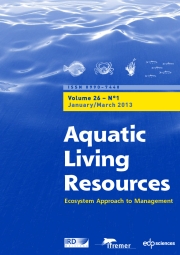Crossref Citations
This article has been cited by the following publications. This list is generated based on data provided by
Crossref.
BRADSHAW, MATT
WILLIAMSON, SANDRA
and
WOOD, LES
2000.
From Input Controls to Quota Management in the Tasmanian Rock Lobster Fishery.
New Zealand Geographer,
Vol. 56,
Issue. 2,
p.
32.
WATANUKI, NAOHIKO
2002.
Japan's International Cooperation for Fisheries and Marine Resources Management.
Fisheries science,
Vol. 68,
Issue. sup2,
p.
1964.
Arlinghaus, Robert
Mehner, Thomas
and
Cowx, Ian G
2002.
Reconciling traditional inland fisheries management and sustainability in industrialized countries, with emphasis on Europe.
Fish and Fisheries,
Vol. 3,
Issue. 4,
p.
261.
Arlinghaus, R.
Mehner, T.
and
Cowx, I. G.
2004.
Handbuch Angewandte Limnologie: Grundlagen - Gewässerbelastung - Restaurierung - Aquatische Ökotoxikologie - Bewertung - Gewässerschutz.
p.
1.
Martin, Kevin St.
2006.
The impact of “community” on fisheries management in the US Northeast.
Geoforum,
Vol. 37,
Issue. 2,
p.
169.
Urquhart, Julie
Acott, Tim
Reed, Matt
and
Courtney, Paul
2011.
Setting an agenda for social science research in fisheries policy in Northern Europe.
Fisheries Research,
Vol. 108,
Issue. 2-3,
p.
240.
Ramirez-Sanchez, Saudiel
2011.
Social Networks and Natural Resource Management.
p.
234.
MOORE, AMELIA
2012.
THE AQUATIC INVADERS: Marine Management Figuring Fishermen, Fisheries, and Lionfish in The Bahamas.
Cultural Anthropology,
Vol. 27,
Issue. 4,
p.
667.
Himes-Cornell, Amber
Maguire, Conor
Kasperski, Stephen
Hoelting, Kristin
and
Pollnac, Richard
2016.
Understanding vulnerability in Alaska fishing communities: A validation methodology for rapid assessment of indices related to well-being.
Ocean & Coastal Management,
Vol. 124,
Issue. ,
p.
53.
Boonstra, Wiebren J
and
Hentati‐Sundberg, Jonas
2016.
Classifying fishers' behaviour. An invitation to fishing styles.
Fish and Fisheries,
Vol. 17,
Issue. 1,
p.
78.
Li, O.
Gray, S. A.
and
Sutton, S. G.
2016.
Mapping recreational fishers’ informal learning of scientific information using a fuzzy cognitive mapping approach to mental modelling.
Fisheries Management and Ecology,
Vol. 23,
Issue. 3-4,
p.
315.
Saint‐Paul, U.
and
Schneider, H.
2016.
The need for a holistic approach in mangrove‐related fisheries research: a specific review of the German and Brazilian research project MADAM.
Journal of Fish Biology,
Vol. 89,
Issue. 1,
p.
601.
Loring, Philip A
2017.
The political ecology of gear bans in two fisheries: Florida's net ban and Alaska's Salmon wars.
Fish and Fisheries,
Vol. 18,
Issue. 1,
p.
94.
Safiq, Alexandrea
Free, Christopher M
Caracappa, Joseph
Valenti, Jessica L
and
Jensen, Olaf
2021.
Perceptions of Ecosystem-Based Fisheries Management Among State Natural Resource Agency Scientists in the Northeastern United States.
Fisheries,
Vol. 46,
Issue. 2,
p.
66.
Ommer, Rosemary E
Perry, R Ian
and
Hoel, Alf Håkon
2022.
The importance of complexities of scale and context in fisheries research and management.
ICES Journal of Marine Science,
Vol. 79,
Issue. 8,
p.
2196.
Scarnecchia, Dennis L.
2023.
The Extinction of the Chinese PaddlefishPsephurus gladius: Transnationalism, Technology Transfer, and Timescape.
Reviews in Fisheries Science & Aquaculture,
Vol. 31,
Issue. 3,
p.
396.
Livermore, Julia
2023.
Beyond discards: cascading socio-economic and environmental effects of a commercial aggregate landings program in Rhode Island.
Frontiers in Marine Science,
Vol. 10,
Issue. ,
Guiot, Danci L.
Lundgren, Seth A.
Phelps, Quinton
Kim, Hae
Lynott, Sean
and
Acar, Umit
2024.
Evaluating Exploitation of White Crappie and Black Crappie in Three Southeast Kansas Reservoirs.
Journal of Applied Ichthyology,
Vol. 2024,
Issue. ,
p.
1.
Olson, Julia
and
Pinto da Silva, Patricia
2024.
Radical interdisciplinarity in scientific practice: placing social networks in marine and fisheries sciences.
Journal of Environmental Studies and Sciences,
Clay, Patricia M.
2025.
Conceptualizing communities of place and practice: Applied Anthropology in a federal context.
Human Organization,
Vol. 84,
Issue. 1,
p.
14.


